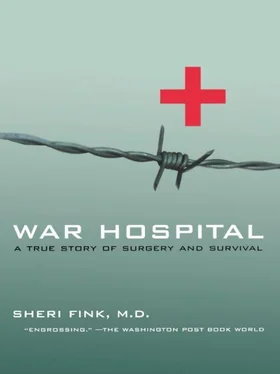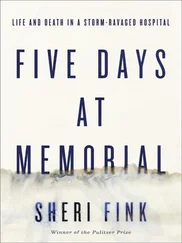Once a year, Ejub received a pair of “Alpinaks,” laced rubber foot coverings for working in the fields. Despite the fact they were his only purchased possession, he was as careless with them as a wealthy boy would be.
“Tie your Alpinaks!” his father admonished him repeatedly.
One morning Ejub brought the sheep out to graze after a big rain. He stuffed his feet into the rubbers, leaving their laces untied.
Each time he lifted a foot, the soggy earth held on to the rubber sole for a moment before letting go. A few times the mud held so tightly that the boy’s foot lifted clear out of his Alpinak and he had hop back to scoop it onto his toes.
The heavy rains had made it an especially fine day for jumping across swollen streams. Ejub came to a swift one. He backed up a few steps to give himself a running start and then took a giant leap. One loose shoe slipped from his foot. He landed and spun around to see the stream carrying it away. He reached for it, but its black form disappeared in the current.
Ejub limped away wearing his one remaining rubber shoe, and wondered how he could return home to face his father. He cast about for answers to the question, “How could you be so careless?” But the excuses he conjured failed to convince even himself. As much as he feared being punished, he regretted even more the loss of something so valuable, something the family could barely afford.
The sun rose higher in the sky and other children joined Ejub and his flock. They came to another part of the river and pushed a tree trunk across to dam it so the sheep could wade without being carried away. Ejub lay on his stomach on the edge of the river and stuck his hand in deep to test the current. His fingers brushed something. He touched it—something rubber. His shoe! There it was, two miles or so from where he’d dropped it. He picked it up, spilled out the water, and tied it tightly to his foot.
It amazed him that something he had thought was lost forever had returned to him. Luck had saved him this time from his carelessness. He told no one of the incident, but remembered it.
Finishing primary school meant the prospect of a future spent, like his parents and several of his older sisters, working in the fields. The village had no high school. Ejub lobbied his parents to let him pursue higher education in the city of Bijeljina, more than sixty miles away. They agreed, and he went to live with his married sister there in the mid-1970s. Ejub studied hard, read widely, and planned to become a writer. A young romantic, he especially loved Bosnian author Meša Selimović, who wrote stories of souls, half-empty, who found one another and joined to form whole beings. Ejub found his spirituality in literature.
While Ejub was gone, his parents modernized along with the industrializing region. He returned home to find them enjoying electricity and a record player. Ejub’s father, who had once gone to prison for refusing to send his four daughters to high school, now warmed to the idea of Ejub going to college. Even the village imam had daughters and sons at the university. Ejub’s father decided he wanted Ejub to become the first local villager to earn the title of doctor.
What did Ejub know about medicine? He grew up watching women treat illnesses with plum brandy, honey, and jam. The village healer pulled teeth without anesthesia, many women gave birth at home, and people went to the hospital only to die.
But medicine would bring him a good income and a healthy dose of respect. His first love, writing, never would. Ejub applied to Tuzla medical school. He was admitted, performed well, and graduated in 1986, taking a job as a general practitioner in Srebrenica. He was so accustomed to being thought of as a hick that when the “city people” first called him doctor, he assumed they were mocking him.
Srebrenica, buried in a valley, oppressed him. In the mountain’s shadows, rather than their heights, he felt as if he was living under siege, and he escaped to the hills whenever his schedule permitted. Years passed without the time to write poems. Medical training kept him too busy even to date. He found himself still single at age twenty-nine, an unusual status for a pleasant-looking, affable young man with a solid profession.
To earn some extra money over the New Year’s holiday in 1988, Ejub worked duty shifts at the health clinic of a mine in the town of Sase, four miles northeast of Srebrenica along winding country roads. One afternoon, he took a coffee break with a friend, who brought along a woman named Mubina. She had manicured nails and a neat hairstyle and looked nothing like an uneducated village woman. She had plenty to say, too, and Ejub liked her instantly. Falling in love, he decided, was like seeing a pair of shoes on a shelf and knowing immediately they are the ones you want.
Mubina gave substance to the abstract ideas that drew Ejub to literature. He told her about Meša Selimović’s ideas of half-empty souls searching to be filled. Poems poured from him again. And from these and the songs he wrote her, Mubina learned Ejub was not, as she had assumed, yet married. The two wed in six months. A year later they had a son, Denis.
Ejub’s world settled into nearly perfect balance. Mubina and Denis inspired him and gave his life meaning. Medicine paid the bills and quenched his thirst for security.
A committee at the Srebrenica clinic determined that the town needed a children’s specialist. They offered Ejub a stipend to study pediatrics in the city of Zvornik, a half-hour drive northwest from Srebrenica on a picturesque road that clung to the mountains rising over the Drina.
Ejub worked there for several months without trouble. But during the icy winter of 1992, he noticed that Serb physicians in Zvornik stopped talking when he entered the room. Things grew so uncomfortable that Ejub stopped traveling every day to the hospital, choosing instead to stay in Srebrenica with Mubina and two-year-old Denis. He watched the news and told Mubina that war was coming. She did not believe him.
Tension came up with the spring flowers that festooned Srebrenica’s terraces. Back at the Srebrenica clinic, the Serb and Muslim medical staff remained respectful to one another, but Ejub noticed that Muslim physicians who had never been religious were greeting one another with the Islamic salutation, sabahajrulah. When fighting broke out in other parts of Bosnia, Ejub repeatedly told Mubina she should leave Srebrenica for a little while with Denis. If “something” started here, if war spread to Srebrenica, it would be even more difficult to survive with a young child. Besides, he assured her, it would only be for a little while.
“I don’t want to go,” Mubina said over and over again. “I don’t want to leave you.”
April 15, 1992, was a cold, sunny Wednesday. Ejub stayed inside while Mubina bundled up Denis and took him out for a walk. She returned in a panic. Two Muslims had been found dead on the road leading south out of Srebrenica the previous night. People were swarming out of town. It looked to Mubina as if everyone in their building was leaving, and she told Ejub she was ready to go. He realized he had never really believed she would act on his advice.
“Let’s go together,” Mubina begged him as they packed up her belongings.
“No,” Ejub told her. He had recently bought some land in Potočari and was in debt. He could not afford to abandon their possessions and would stay to protect their apartment. He felt too proud to just give up his home. And he was also too curious. He wanted to see for himself what would happen.
“It won’t be that long,” he told her. “We’ll be together again soon.”
Like the short storms that come in April , he thought, this soon will pass .
Читать дальше












